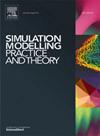Incentive-driven computation offloading and resource pricing strategy in vehicular edge computing assisted with idle mobile vehicles
IF 3.5
2区 计算机科学
Q2 COMPUTER SCIENCE, INTERDISCIPLINARY APPLICATIONS
引用次数: 0
Abstract
The emergence of vehicular edge computing (VEC) has introduced a new computational paradigm for high-quality processing of computing services in Internet of Vehicles (IoV) scenarios. However, due to the limited computational resources of the VEC server, it is not sufficient to adequately meet the demand for highly concurrent computational services in high-density vehicular communication networks. To address this issue, we consider an idle mobile vehicles assisted vehicular edge computing framework and propose a hybrid Stackelberg-Match cooperative task offloading and resource pricing algorithm (SMOP). The algorithm considers the mobility of vehicles and the duration of channels, coordinating the computational resources of fixed VEC servers and idle mobile vehicles within the vehicular network (VN). This enhances offloading efficiency and maximizes participant benefits. Specifically, the Stackelberg game is used to derive differentiated pricing schemes for idle mobile vehicles and VEC servers for different vehicular tasks, and the stable matching method is employed to determine task offloading strategies. Finally, we conduct experiments on a real Chengdu traffic dataset. The results demonstrate that the proposed solution effectively reduces offloading costs and exhibits strong robustness in handling latency-sensitive and data-intensive service requests.
闲置移动车辆辅助车载边缘计算中的激励驱动计算卸载和资源定价策略
车载边缘计算(VEC)的出现为高质量处理车联网(IoV)场景中的计算服务引入了一种新的计算模式。然而,由于 VEC 服务器的计算资源有限,不足以充分满足高密度车载通信网络对高并发计算服务的需求。为解决这一问题,我们考虑了空闲移动车辆辅助车载边缘计算框架,并提出了一种混合堆栈伯格-匹配合作任务卸载和资源定价算法(SMOP)。该算法考虑了车辆的移动性和信道的持续时间,协调了车载网络(VN)内固定 VEC 服务器和闲置移动车辆的计算资源。这提高了卸载效率,并使参与者的利益最大化。具体来说,我们利用斯塔克尔伯格博弈推导出针对不同车辆任务的闲置移动车辆和 VEC 服务器的差异化定价方案,并采用稳定匹配法确定任务卸载策略。最后,我们在一个真实的成都交通数据集上进行了实验。结果表明,所提出的解决方案有效降低了卸载成本,并在处理延迟敏感型和数据密集型服务请求时表现出很强的鲁棒性。
本文章由计算机程序翻译,如有差异,请以英文原文为准。
求助全文
约1分钟内获得全文
求助全文
来源期刊

Simulation Modelling Practice and Theory
工程技术-计算机:跨学科应用
CiteScore
9.80
自引率
4.80%
发文量
142
审稿时长
21 days
期刊介绍:
The journal Simulation Modelling Practice and Theory provides a forum for original, high-quality papers dealing with any aspect of systems simulation and modelling.
The journal aims at being a reference and a powerful tool to all those professionally active and/or interested in the methods and applications of simulation. Submitted papers will be peer reviewed and must significantly contribute to modelling and simulation in general or use modelling and simulation in application areas.
Paper submission is solicited on:
• theoretical aspects of modelling and simulation including formal modelling, model-checking, random number generators, sensitivity analysis, variance reduction techniques, experimental design, meta-modelling, methods and algorithms for validation and verification, selection and comparison procedures etc.;
• methodology and application of modelling and simulation in any area, including computer systems, networks, real-time and embedded systems, mobile and intelligent agents, manufacturing and transportation systems, management, engineering, biomedical engineering, economics, ecology and environment, education, transaction handling, etc.;
• simulation languages and environments including those, specific to distributed computing, grid computing, high performance computers or computer networks, etc.;
• distributed and real-time simulation, simulation interoperability;
• tools for high performance computing simulation, including dedicated architectures and parallel computing.
 求助内容:
求助内容: 应助结果提醒方式:
应助结果提醒方式:


